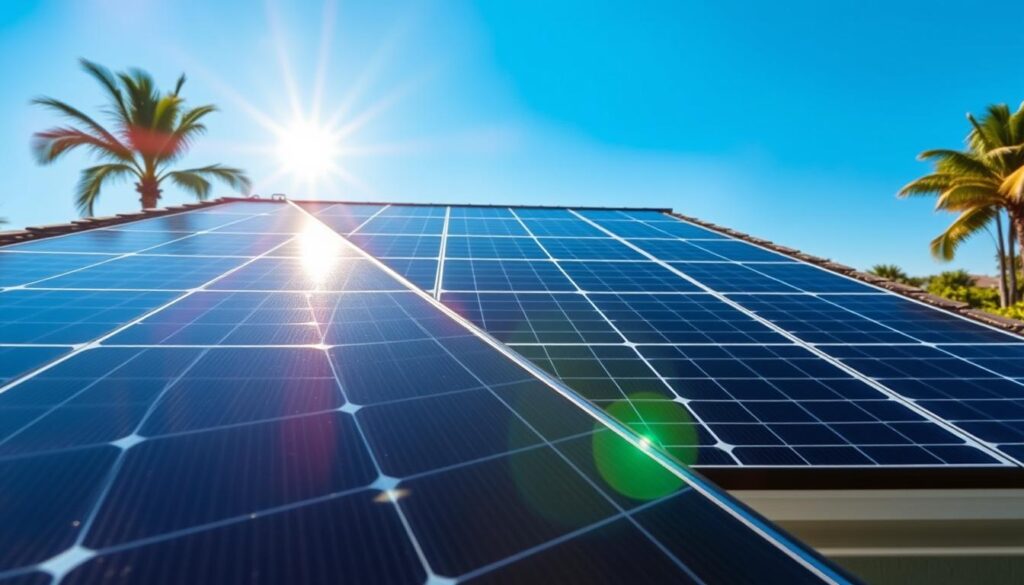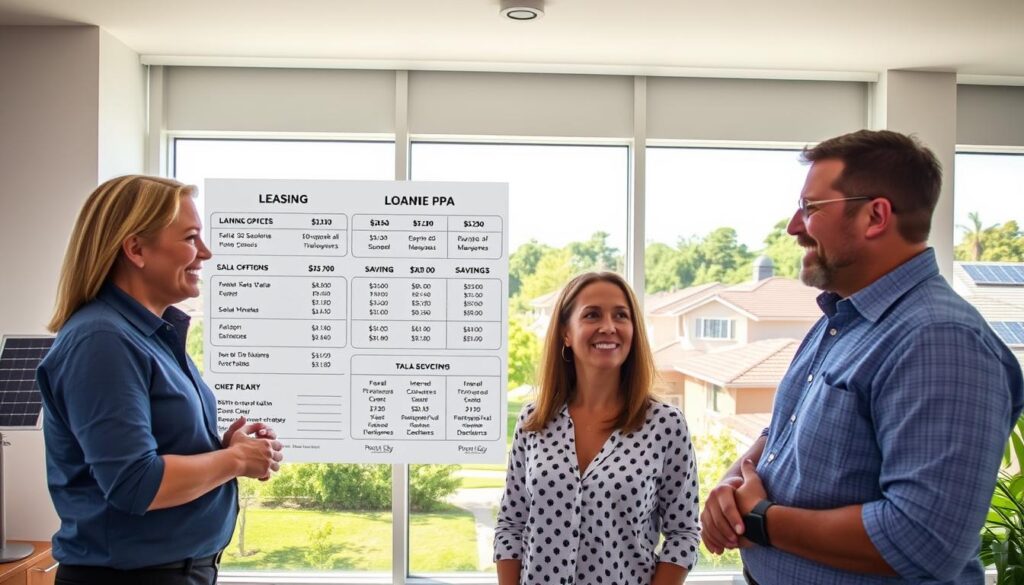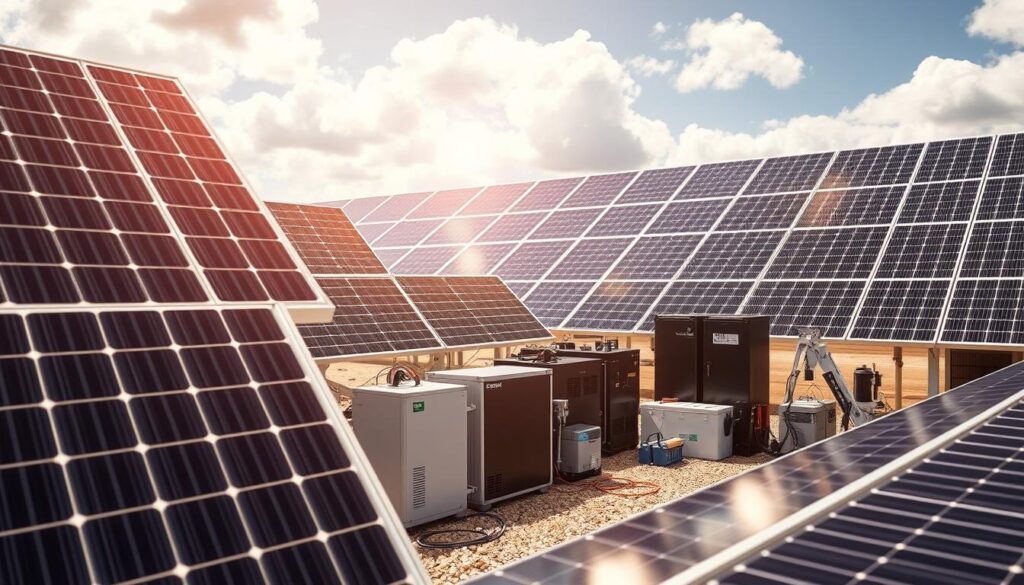Florida’s sunny climate makes it a prime location for solar energy. With 237 sunny days yearly, the Sunshine State ranks fourth nationally in solar adoption. Despite this potential, many homeowners are just beginning to explore solar panels for sale in florida as affordable solar panels become more accessible. Over 81,000 residents have already compared quotes via platforms like EnergySage, signaling a surge in interest. As utility companies invest in clean energy, installations could double in the next five years, aligning with Florida’s goal to add 12,153 MW of solar power.
The shift to solar offers clear benefits. Systems like the 14.22 kW setup—common for average homes—can cut electric bills by 80% to 109%. State incentives, including a 6% sales tax exemption, make affordable solar panels even more appealing. With costs dropping 43% nationwide, now is the time to consider clean energy for long-term savings.
Key Takeaways
- Florida averages 237 sunny days yearly, ideal for solar energy.
- Solar sales tax exemptions and federal credits reduce system costs by up to 30%.
- Average households save $30,676–$41,503 over 20 years with solar.
- Florida ranks fourth nationally in solar capacity but aims to boost installations further.
- Modern systems like 450-watt panels offer 25–40-year warranties, ensuring durability.
The Benefits of Solar Energy for Florida Residents
Florida’s sunny climate makes it a top destination for residential solar power. With over 237 sunny days annually, homeowners can harness this resource to cut costs and protect the environment. Renewable energy solutions offer real-world advantages—from lower bills to cleaner air. Let’s explore how solar transforms everyday life.
Cost Savings on Electricity Bills
A 5kW system costs about $13,000 before incentives. Federal rebates and tax credits reduce this by up to 50%, making solar affordable. Key savings include:
- 30% federal tax credit: saves up to $3,900 instantly
- Net metering: utility companies like FPL give bill credits for excess energy
- Average payback in 11 years, with $40k saved over 25 years
Environmental Impact
One home with solar reduces emissions like planting 100 trees yearly. Florida’s solar growth ranks 5th nationally, cutting carbon pollution. State incentives encourage cleaner air and water, shielding fragile ecosystems.
Energy Independence
Break free from rising utility rates. Solar systems last decades, and Florida’s tax laws exempt solar from property taxes. Home values rise 4.1%, adding equity without extra costs. No more surprise bill hikes!
From immediate bill relief to long-term savings, solar energy empowers Floridians to take control of their energy future.
Why Choose Solar Panels in Florida?
Florida’s year-round sunshine and supportive policies make it a leader in solar energy adoption. With over 230 sunny days annually, the state’s climate turns sunlight into savings. From tax breaks to rising home values, here’s why now is the time to explore solar panels for sale in florida.
Abundant Sunshine Year-Round
Florida’s sunlight isn’t just for beaches—it’s a resource. Solar panels thrive in this climate, producing energy even in winter. The state’s average of 230 bright days ensures consistent power generation. This reliability means fewer grid dependencies, cutting monthly bills by up to 80%.
State Incentives and Rebates
- 30% federal tax credit available until 2032
- No Florida sales tax on solar equipment
- No property tax on installed systems
These savings lower upfront costs. Residents can also compare solar panel companies in florida to find the best deals.
Increasing Property Value
Solar installations boost home equity. Studies show solar-equipped homes sell 20% faster and command premium prices. Buyers pay up to 4.1% more for solar-ready properties. This investment pays off long-term, adding thousands to resale value.
How to Select the Right Solar Panels
Choosing the right solar panels starts with understanding your options. Florida’s sunny climate makes efficiency and durability key factors. Consider these steps to find the best solar panels for home use.

Types of Solar Panels Available
Three main types dominate the market:
- Monocrystalline: High efficiency for small spaces
- Polycrystalline: Cost-effective for larger rooftops
- Bifacial: Capture light from both sides, boosting output up to 20% like in Duke Energy’s projects
Thin-film panels are lightweight but less efficient for most residential use.
Evaluating Solar Panel Efficiency
Look for panels with high wattage ratings and low degradation rates. Leading brands like REC Group and Panasonic guarantee 84-92% of original output after 25 years. Check warranties: Panasonic’s 25-year product warranty covers performance and physical defects. Bifacial panels from Jinko Solar add value in sunny areas.
Choosing a Reputable Supplier
Research companies like Solar Optimum, a Tier 1 provider since 2008. Verify certifications like NABCEP and read customer reviews. When buy solar panels online, ensure the seller offers installation support and financing options. Compare quotes from at least three local Florida installers to find the best price and service.
Start by visiting the Clean Energy States Alliance website for financing guides. Prioritize suppliers offering the federal 30% tax credit and long-term performance guarantees.
Understanding Solar Panel Installation
Florida’s sunny climate makes florida solar panel installation a smart investment. But what does the process involve? Let’s break it down step by step.
- Site Assessment: A professional evaluates your roof condition, shading, and sunlight exposure. This ensures optimal placement for maximum energy absorption.
- Permitting: Local permits are secured. For instance, Duke Energy’s large project took six months, but residential systems often finish in 3–6 weeks.
- System Setup: Panels, inverters, and mounting hardware are installed. Most homes use 6-kW systems costing $12,500–$17,000 before incentives.
- Inspection & Activation: Final checks confirm safety and efficiency. Once approved, your system starts generating power!
“A well-planned installation ensures your system lasts 25+ years,” says Solar Energy World, a Florida-based installer with 15 years of experience.
Preparations Needed Before Installation
Before starting, homeowners must:
- Check roof integrity—repairs may be needed before mounting panels.
- Update outdated electrical systems to handle solar-generated power.
- Request solar panel installation quotes from 3–4 providers to compare costs and inclusions.
- Clear overgrown trees or structures blocking sunlight.
Planning ahead reduces delays. With Florida’s 2,800 annual sunshine hours, preparing properly ensures your system runs efficiently from day one.
Financing Options for Solar Panels
Going solar doesn’t require upfront cash. Florida’s mix of programs and incentives makes affordable solar panels possible for every budget. Let’s break down how to pay less while boosting your home’s energy future.
Leasing vs. Buying Solar Panels
- Leasing: BrightSave™ Monthly offers solar energy systems with $0 down. Pay monthly fees instead of electricity bills.
- Buying: Own panels with loans like BrightAdvantage™. Earn 30% Federal Tax Credit (ITC) until 2032.

Available Tax Credits
Florida’s tax exemptions start with no sales tax on solar energy systems since 1997. Combine this with the federal ITC—30% of system cost—as seen in this example:
A 5kW system costs $15,000. The ITC saves $4,500 upfront.
Property taxes also stay low: no tax hikes for solar upgrades.
Solar Financing Programs
Florida’s programs stretch payments over time. PACE loans let homeowners pay over 25 years. SELF loans start at 5% interest, and FPL’s SolarTogether lets renters and homeowners join solar cooperatives. Veterans and women get no-credit-score loans via KIVA.
- Florida Keys Electric: $35,000 loans for grid-tied systems.
- Suncoast Credit Union: Competitive rates for home equity-backed loans.
With over 255,000 Floridians already powered by solar, now’s the time to explore what fits your budget.
Solar Panel Maintenance and Care
Maintaining your residential solar power system ensures it runs efficiently for decades. Most best solar panels for home setups need minimal care beyond annual checks. Florida’s frequent rain helps keep panels clean, but regular upkeep keeps energy output high.
Regular Maintenance Tips
- Clean panels once yearly—professional cleaning takes under two hours and costs vary by system size.
- Monitor inverter performance monthly; this device converts sunlight into usable electricity. A malfunctioning inverter lowers energy output.
- Check for debris or shading from new trees. Blocked panels lose 15–20% efficiency.
Understanding Warranties
Warranty coverage varies. Most panels come with 25+ year product warranties, while inverters have 10-year guarantees. Florida Power Services, active for 17 years, covers defects from their installations at no extra cost. However, damage from storms or surges isn’t covered. PPM Solar, serving Northcentral Florida for 14 years, notes that 90% of issues are fixed in under an hour during service calls.
Always keep records of maintenance visits. Ground-mounted systems are easier to maintain than rooftop panels, which may cost more over time. Most systems retain 80% efficiency after 25 years with proper care.
Common Myths About Solar Energy

Many homeowners in Florida hesitate to adopt solar energy due to myths. Let’s clear the air and highlight how solar energy systems can work for you.
Debunking Misconceptions
- Myth: Solar needs direct sunlight 24/7. Fact: Solar panels still generate 10–25% of their output on cloudy days. Modern systems convert 22% of sunlight into electricity, even with indirect light.
- Myth: Solar is a luxury cost. Fact: A $20,000 system drops to $14,000 after the 30% federal tax credit. Most systems pay for themselves in 7 years and last 25–30 years.
- Myth: Panels ruin roofs. Fact: Proper installation protects roofs. Companies like Freedom Solar offer 25-year warranties covering workmanship, ensuring long-term reliability.
Real-Life Success Stories
“Switching to solar cut my bill by 90%.”
– A Florida homeowner using FPL SolarTogether, arenewable energy solutionsprogram for renters or those without rooftop access.
Net metering lets users sell unused energy back, reducing bills further. Homes with solar sell 24.7% faster and gain a 4.1% value boost. These real results show how solar energy systems align with today’s energy needs.
The Future of Solar Energy in Florida
Florida’s solar energy journey is just beginning. Innovations like renewable energy solutions and advanced solar energy systems promise even brighter days ahead. Let’s explore what’s next.
Emerging Technologies
Duke Energy’s Vision Florida program is leading the charge with cutting-edge tech:
- Floatovoltaics: Solar panels on water, saving land space
- Microgrids for reliable power during outages
- Battery storage systems to store excess energy
Predictions for Growth
Florida’s solar capacity hit 3.1 GW by Q3 2024—nearly matching 2023’s record. By 2028, experts predict Florida will top the U.S. in residential solar adoption. Key highlights:
| Project | Capacity | Homes Powered |
|---|---|---|
| Bighorn Solar | 300 MW | 60,678 homes |
| Comanche Solar | 150 MW | 30,339 homes |
Florida Power & Light (FPL) is already halfway to its 4 GW energy storage goal by 2033, with 520 MW installed. Their CEO noted,
“Florida’s solar potential is limitless. We’re building a grid that’s cleaner and smarter.”
With U.S. solar manufacturing hitting nearly 40 GW capacity, Florida’s sunny climate and policy-driven utility investments ensure steady progress. As more homes and businesses adopt these systems, the Sunshine State is poised to redefine clean energy leadership.
Solar Panel Power and Performance
Maximizing solar energy output starts with choosing the right best solar panels for home setups. Florida’s 237 sunny days a year provide ideal conditions, but performance hinges on panel type and placement.
Factors Affecting Efficiency
Key variables like panel design and environment directly impact energy output. Bifacial panels, for example, can boost power by 10–20% by capturing reflected light from roofs or ground surfaces. Floating solar panels installed over water see a 15% efficiency gain due to water cooling. Temperature and shading also play roles—heat reduces output by 0.5% per degree above 25°C.
| Panel Type | Efficiency Boost | Best Use |
|---|---|---|
| Bifacial | 10–20% | Rooftops with light-reflective surfaces |
| Floating | Up to 15% | Water bodies or ponds |
Monitoring Energy Production
Real-time tracking tools let homeowners see energy generation and spot dips quickly. Many solar energy systems include apps showing daily, weekly, or yearly performance. An average 5kW system in Florida can generate 20,000 kWh annually—enough to offset $2,400 yearly on electric bills.
“Our system hit 84% of our yearly electricity needs after switching to bifacial panels.” — Florida homeowner, 2023
Regular checks ensure panels stay clean and free of debris. Pairing with inverters optimized for hot climates further safeguards performance. Florida’s net metering policies also let users sell unused energy back to the grid, adding financial benefits.
Local Solar Companies in Florida
Choosing the right solar panel companies in florida ensures your system meets local needs and codes. Start by researching providers active in your area.
Top Providers in Major Cities
Major cities like Miami, Orlando, Tampa, and Jacksonville have reputable options. Look for firms with NABCEP certification and state licenses.
| City | Recommended Companies |
|---|---|
| Pensacola | SunFarm Energy (since 2011, NABCEP certified) |
| Orlando | Sunrun (BrightPath™ design tech) |
| Tampa | Florid Solar Solutions (licensed since 2005) |
Comparing Quotes and Services
When requesting solar panel installation quotes, compare these key factors:
- Warranty terms – Look for 10+ year labor guarantees.
- Certifications – Check for NABCEP-trained installers.
- Equipment quality – Ask about panel efficiency ratings (19%+).
“Always verify licenses and read reviews before signing contracts.”
Companies like SunFarm Energy provide detailed solar panel installation quotes including battery backup options. Compare pricing alongside service terms to avoid hidden costs.
Taking the First Step Towards Solar Energy
Ready to turn the sun’s power into savings? Start by evaluating your home’s potential for solar. Florida’s abundant sunlight makes it ideal for solar, but roof direction and shading matter. Online tools like NREL’s PVWatts can estimate your system’s output. Check if your roof faces south or southwest for optimal performance. Local installers can assess space and structural integrity during a free site visit.
Assessing Your Home’s Solar Potential
Begin with a professional assessment. Florida’s solar companies use satellite imagery to gauge sun exposure and roof suitability. Compare quotes from local vs. national firms—studies show local providers often cost 10% less. Factor in your monthly FPL bill to size your system. A $100 bill, for example, needs a 6.84-kW system costing around $12,900 after the 30% federal tax credit.
Contacting Local Experts
Reach out to licensed installers for tailored advice. Ask about warranties and insurance requirements. Tier 1 systems under 11,764 watts don’t need extra coverage, but confirm with your insurer. Compare proposals from at least three providers. Online platforms let you buy solar panels online but verify local florida solar panel installation costs. Use FPL’s net metering to track energy sent to the grid, reducing bills below their $25 minimum.
